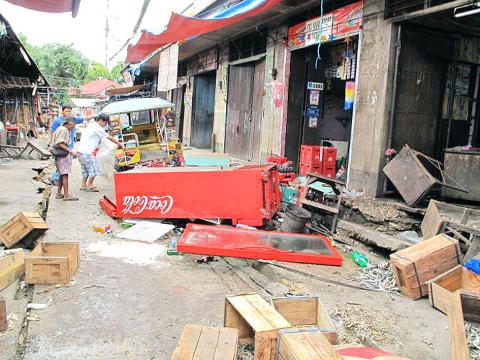A magnitude 6.8 earthquake struck off the coast of the central Philippines yesterday, killing at least 43 people and causing widespread panic, officials said.
The powerful quake hit in a narrow strait between the heavily populated island provinces of Negros and Cebu, causing buildings to collapse, cracking roads and bridges, and shutting down the power supply.
In Cebu City, a popular tourist destination and city of 2.3 million, hotel guests scrambled to higher floors as unfounded rumors that a huge tsunami was bearing down spread by text message.

Photo: EPA
At least 29 were killed by landslides, while 10 others were crushed by collapsing buildings in the mountainous town of Guihulngan in Negros, regional military official Colonel Francisco Patrimonio said.
There was also an undetermined number of wounded, he added.
“Some private homes collapsed along with our court house and parts of the public market. We got people out of the buildings, but we could not evacuate the homes,” police chief Senior Inspector Alvin Futalan said.
Four other people were killed in other parts of Negros, which also suffered widespread power outages and cracked roads and bridges, hampering rescue efforts, Patrimonio told reporters.
Civil defense chief Benito Ramos said the violent shaking of buildings in Cebu City — 50km from the epicenter — led to broken windows and cracks on some walls even if no high rises sustained major damage.
Local residents said there was panic in the country’s second-biggest city, but there were no immediate reports of casualties or major damage there.
“There is news going around of tsunami waves, so we are doing our best to keep everybody calm,” Barbi Patino, a spokesperson for the 17-story Parklane International Hotel in Cebu said.
Pedro Baldomino, a student in Cebu, said he saw many office workers in downtown Cebu leaving their buildings after a public announcement on radio warned people to brace for expected aftershocks.
“I was having lunch when the ground shook. Water spilled from glasses and plates clanked. Some of the diners rushed outside, some of us stayed underneath the tables,” he said.
Philippine government seismologists earlier raised a precautionary tsunami alert over the quake, but lowered it two hours later.

PREPAREDNESS: Given the difficulty of importing ammunition during wartime, the Ministry of National Defense said it would prioritize ‘coproduction’ partnerships A newly formed unit of the Marine Corps tasked with land-based security operations has recently replaced its aging, domestically produced rifles with more advanced, US-made M4A1 rifles, a source said yesterday. The unnamed source familiar with the matter said the First Security Battalion of the Marine Corps’ Air Defense and Base Guard Group has replaced its older T65K2 rifles, which have been in service since the late 1980s, with the newly received M4A1s. The source did not say exactly when the upgrade took place or how many M4A1s were issued to the battalion. The confirmation came after Chinese-language media reported

A Ministry of Foreign Affairs official yesterday said that a delegation that visited China for an APEC meeting did not receive any kind of treatment that downgraded Taiwan’s sovereignty. Department of International Organizations Director-General Jonathan Sun (孫儉元) said that he and a group of ministry officials visited Shenzhen, China, to attend the APEC Informal Senior Officials’ Meeting last month. The trip went “smoothly and safely” for all Taiwanese delegates, as the Chinese side arranged the trip in accordance with long-standing practices, Sun said at the ministry’s weekly briefing. The Taiwanese group did not encounter any political suppression, he said. Sun made the remarks when

The Taiwanese passport ranked 33rd in a global listing of passports by convenience this month, rising three places from last month’s ranking, but matching its position in January last year. The Henley Passport Index, an international ranking of passports by the number of designations its holder can travel to without a visa, showed that the Taiwan passport enables holders to travel to 139 countries and territories without a visa. Singapore’s passport was ranked the most powerful with visa-free access to 192 destinations out of 227, according to the index published on Tuesday by UK-based migration investment consultancy firm Henley and Partners. Japan’s and

BROAD AGREEMENT: The two are nearing a trade deal to reduce Taiwan’s tariff to 15% and a commitment for TSMC to build five more fabs, a ‘New York Times’ report said Taiwan and the US have reached a broad consensus on a trade deal, the Executive Yuan’s Office of Trade Negotiations said yesterday, after a report said that Washington is set to reduce Taiwan’s tariff rate to 15 percent. The New York Times on Monday reported that the two nations are nearing a trade deal to reduce Taiwan’s tariff rate to 15 percent and commit Taiwan Semiconductor Manufacturing Co (TSMC, 台積電) to building at least five more facilities in the US. “The agreement, which has been under negotiation for months, is being legally scrubbed and could be announced this month,” the paper said,